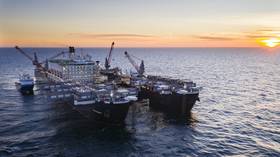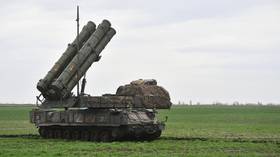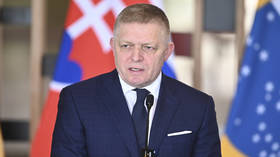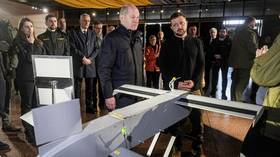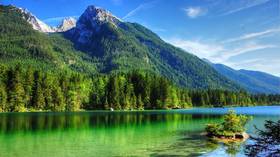Thanks, Brussels! Now Poland can have its own gas pipeline at EU taxpayers’ expense
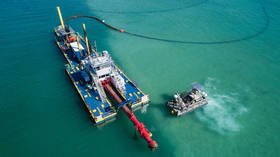
Poland has signed a key contract for the construction of the Baltic Pipe gas pipeline. Sponsored by the EU, the project has been hailed as a major step for Warsaw and even Europe towards cutting dependence on Russian gas imports.
The project is set to deliver gas from Norway to the Danish and Polish markets, as well as further into Europe. On Monday, Poland’s state-owned gas grid operator Gaz-System signed a deal worth €280 million ($306 million) with Italian oil and gas engineering company Saipem to begin pipelaying works in the Baltic Sea.
Also on rt.com Russia has ships to complete Nord Stream 2 pipeline without European helpPoland considers the future gas link, set to become operational in 2022, as a way to finally ditch Russian imports of blue fuel. Russia has long been the main supplier for the country, but the contract with Russian energy major Gazprom expires in 2022.
According to the project’s website, the Baltic Pipe will “contribute to better diversification of gas supply sources in Denmark and the Baltic Sea region as well as in Central and Eastern Europe.” However, the ambitious goal may face some major hurdles, analysts believe.
Firstly, Norwegian Sea resources are drying up. Secondly, given that Europe has a single energy market, the gas flowing via the new route will have the same source – Norway – it can force Oslo to cut supply volumes to Western Europe via other links.
“Norway has no extra gas, so this raises the question how this pipeline will be filled. Moreover, to fill the Baltic Pipe, Norway will have to redirect gas from the UK and Western Europe, which can be problematic,” chief analyst at Premier BCS, Sergey Suverov, told RT.
This means that none or very little extra supply would be added to the European market. Meanwhile, demand is set to grow, including in Poland, which is one a few countries in the European family still vastly reliant on coal. If Warsaw wants to fit in, it will have to switch to other sources of energy, and opting for gas is one of the easiest ways, according to Alexei Grivach of the National Energy Security Fund.
“This operation makes no sense if we consider the European [gas] market as a single entity,” he told RT. “If the Norwegian gas is extracted from the Western European market... this volume should be compensated by some other sources.”
And here is where Russian gas exports, which Poland is so willing to ditch, should help to fill in the gap. The supplies may be covered by the Nord Stream-2 project, with the capacity of five Baltic Pipes, and running along the bottom of the Baltic Sea. Despite the project being delayed due to US efforts to derail it, the pipelaying vessel meant to finish it arrived to the Baltic Sea last week.
Also on rt.com Russia resumes natural gas supplies to China via Power of Siberia pipelineThus the long-awaited Baltic Pipe may serve Poland’s political ambitions rather than significantly changing the situation in the European energy market, analysts believe. However, it is European taxpayers who are set to pay for those political games, given that the European Union agreed to partially subsidize the project.
“There are declared and real goals. The real task is to reform its infrastructure and create additional options and sources, and not at its own expense, but at the expense of the European taxpayers,” Grivach said.
For more stories on economy & finance visit RT's business section
